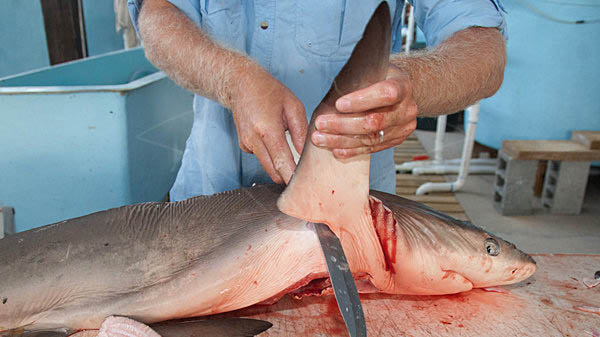Please ask the State of Florida to prohibit the possession, sale, trade, purchase, shipping, barter, exchange, or distribution of shark fins whether still intact as part of a whole or partial shark carcass or already dismembered; providing criminal penalties and the assessment of specified fees and costs by the Fish and Wildlife Conservation Commission.
The act of shark finning may be illegal but a loophole in the law allows fisherman to fin the shark at the dock, and contribute to the shark finning trade by export, barter or the any other means mentioned above.
Sharks occupy the top of the aquatic food chain and play a critical role in the maintenance of a healthy and functioning marine ecosystem. Data from state, federal, and international agencies show a decline in shark populations both locally and worldwide. The decline in shark populations is an urgent problem that upsets the balance of species in marine ecosystems and constitutes a serious threat to biodiversity. Sharks have particular characteristics that make them more vulnerable to overfishing, as sharks are slow to reach reproductive maturity, birth small litters, and cannot rebuild their populations quickly once overfished.
What is Shark Finning?
- Shark finning refers to the removal and retention of shark fins and the discard at sea of the carcass. The shark is most often still alive when it is tossed back into the water. Unable to swim, the shark experiences physical distress and difficulty in maintaining adequate oxygenation, causing millions of sharks to die a slow death by starvation, predation, suffocation, and drowning.
- Any shark is taken-regardless of age, size, or species.
- Longlines, used in shark finning operations, are the most significant cause of losses in shark populations worldwide.
- Shark fins are among the most expensive seafood products, commonly retailing at US$400 per kg. In the United States, where finning is prohibited, some buyers regard the whale shark and the basking shark as trophy species, and pay $10,000 to $20,000 for a fin.
Impact of Shark Finning
- Over 8,000 tons of shark fins are processed each year. The fins only amount to 4% of a shark’s bodyweight. This means that some 200,000 tons of shark are thrown back into the sea and discarded.
- The International Union for Conservation of Nature’s Shark Specialist Group say that shark finning is widespread, and that “the rapidly expanding and largely unregulated shark fin trade represents one of the most serious threats to shark populations worldwide”
- Some shark populations have reduced from 70% in some species and up to 95% in others.
- Already 18 species of sharks have been listed as endangered by the International Union for the Conservation of Nature (IUCN).
The shark fin is used as a main ingredient in shark fin soup, which is a Chinese “delicacy.” The actual shark fin is tasteless and has no nutritional value, which is why the fin is boiled in a chicken or beef broth to add flavor. The United States Environmental protection agency advises women and young children to avoid it due to high mercury levels.
It is devastating that Florida allows participation in the barbaric shark fin trade. Please help us to stop all means of participation within our state in an effort to help save sharks.







